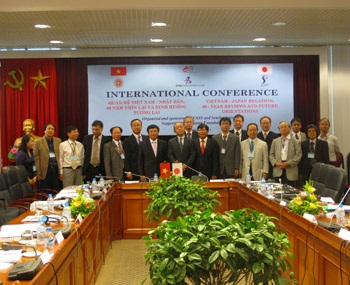Japanese guests included Mr. Tanizaki Yasuaki, Japanese Ambassador in Vietnam, Prof. Matsuki Kennichi, member of Senshu University’s Standing Committee, and twenty professors and doctors of Senshu University, Ibaraki (Japan).
Vietnamese guests included Prof.Dr. Nguyen Xuan Thang, member of the Central Committee of the Vietnamese Communist Party, President of VASS; Prof.Dr. Nguyen Quang Thuan, Vice President of VASS; and managers, scientists and scholars from member research institutions of VASS and a number of universities around Vietnam.
Speaking at the opening ceremony of the conference, Prof.Dr. Nguyen Xuan Thang emphasized that Vietnam and Japan were two countries with đồng văn, đồng chủng, đồng châu, meaning many similarities in culture and society. More than 10 centruries ago, Vietnam and Japan had engaged in several exchanges of Confucianism and Buddhism. In the 16th century, many Japanese merchants were doing business in Vietnam. Some of them settled down and built a “Japanese neighborhood” in Hoi An (Quang Nam province). Since then, Vietnamese ceramics were seen in Japan and many Japanese traditional items were seen in Vietnam. Throughout history, the Vietnam-Japan relationship has not only been maintained but also been continuously reinforced, developed and enriched. With the establishment of formal diplomatic ties on 21st of September 1973, relations between the two countries became even deeper, contributing to peace, stability and development for the benefit of the people of both countries.
 |
After 40 years of construction and development, Vietnam and Japan became strategic partners when on16th and 17th of January 2013, the two governments agreed to elevate their mutual relationship to a new level and designate 2013 as “Vietnam-Japan Friendship Year”, a starting point for a new period of development of the stratergic partnership between the two countries.
Currently, Japan is one of Vietnam’s leading development partners, accounting for one-third of total forgein aid received by Vietnam. Japan is one of Vietnam’s three biggest export markets, the largest and most successful foreign investor in Vietnam with the highest propotion of FDI put into practice. Vietnam has also become an attractive destination for Japanese tourists. Exchanges in the fields of culture, science, technology, education, training and human resource development between the two countries are expanding ever more.
The “Vietnam–Japan Relations: 40 years to look back and future directions” conference was an opportunity for both sides to look back the over last 40 years, take pride in the results produced by both sides, and look forward to a better future for the strategic partnership between the two countries in order to contribute to the building of peaceful collaboration and prosperous development within the region and the world.
Speaking at the conference, Mr. Tanizaki Yasuaki, Japanese Ambassador in Vietnam, emphasized that relations between Vietnam and Japan were based on mutual understanding between the people of the two countries, and were leading both countries towards further cooperation and development. In the future, especially in the next 10 years, Japan would apply a policy of opening of the labor market, creating further opportunities for Vietnamese to work in Japan, especially in the field of health.
The conference was not only a celebration of 40 years of dilopmatic relations between Vietnam and Japan, but also a scientific forum for scholars from both countries to discuss and propose solutions, and therefore a firm and appropriate step to take in moving the strategic partnership between Vietnam and Japan toward higher quality and greater efficiency in a new context of opportunities and challenges.
Pham Vinh Ha







